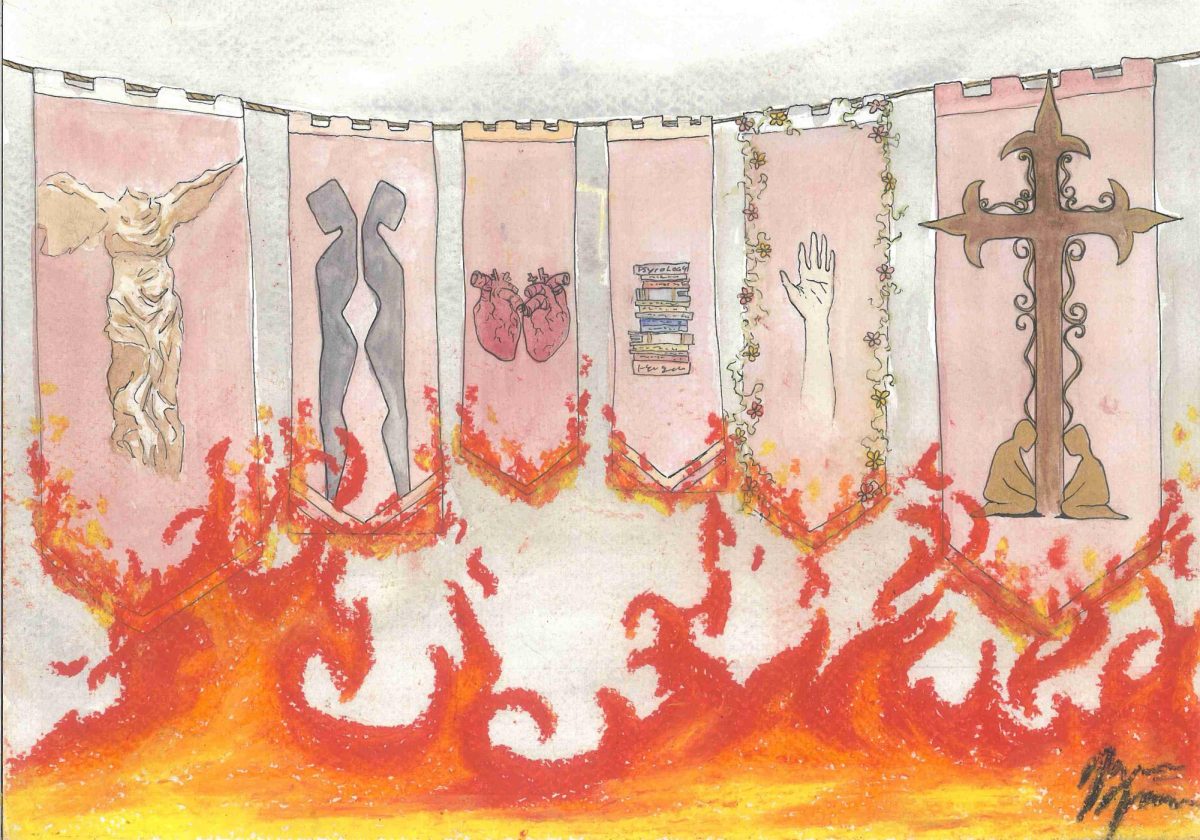At first glance, there is something strange about a man cheering for a team full of athletes who are not from the city they represent, athletes whom the spectator does not personally know yet is deeply and emotionally connected to, athletes who are playing a sport that many in the audience do not even play. From the outside, it looks astonishingly stupid.
The finals of the NCAA Tournament, also known as March Madness, are this coming Monday. It is a season finale to a show full of unpredictability, passion and uncalled travels. Sports fans across the United States will tune in at bars and at home, not necessarily because they love basketball, but because they want to know what in the world is going to happen.
Watching professional sports, at times jokingly referred to as “sportsball” by those who remain unimpressed by this social institution, is a spectacle. Broadcasts of professional sports are loud, flamboyant, and above all, dramatic.
ESPN pundits cover everything from the NFL to the PGA with the sort of energy and seriousness that would make it seem as if Lebron James is fit to be a world leader. Sports news is regarded as equal in status to conventional news.
Why are sports taken so seriously? Why do some people watch sports like it is the only thing on TV?
Perhaps the widespread appeal of sports, why people will name their kids after athletes that they have never met and tattoo team logos on their chest, is directly related to its value as entertainment.
The compelling element of sports, in the thrill of victory and the agony of defeat, is that it is the best reality television in the world, “the best” in the sense that it is actually real.
Sports, in terms of authenticity, trumps “The Amazing Race,” “Keeping Up With the Kardashians” and even “The Bachelor.”
Barring corruption, match fixing and gambling, sports drama is completely legitimate. Every last minute goal, game winning ace, dunk and touchdown is exciting not only because it is entertaining to watch, but because we know that this outcome has not been scripted and is genuinely unpredictable.
Every time that we watch a game, or even the finale of “The Bachelor,” our minds are abuzz with the question, “What is going to happen?” Wondering “Who gets the final rose?” is equivalent to “Who is going to win?”
Obviously some knowledge of the rules of the sport is required in order to make the sports drama coherent. If you don’t know the jargon or the rules, the excitement of the announcers and the players after James Harden perfectly executing a Euro step for a potential 3-point play is diminished.
The greater the investment into the world of sports, manifested in learning about the lives of the players, the rules of the game, the history of the sport and financially investing in team sports wear, the greater the drama for the viewer.
The drama is not limited to the game, it is comprised of the clothes Russell Westbrook wears to games and seeing Cristiano Ronaldo refuse to celebrate after scoring against his old team. The more that we know about athletes and their sports, the greater the significance of each event.
The narratives seen in sports can be easily found in other reality TV shows. Each episode of “The Bachelor” is constructed upon the questions of whether Colton will find true love and whether or not he will remain a virgin.
Similarly, the drama of sports is built on questions that we can not the answer to unless we tune in with other curious fans: “Will she score?” “Is he healthy enough to play?”and “Will we win?”
Cable television has been kept alive by two things: live news and live sports. While sports and news are both real and unpredictable, television news (everything from CNN to Fox) seems to be designed with the intention to make the audience believe that they should be afraid of everything outside their home.
Sports, on the other hand, are something that we can invest out time in without feeling scared.
Watching sports can seem pointless, as people invest time and money connecting to a team an ocean away, yet the value of the authenticity of every sporting event cannot be denied.
We, and that includes myself, will watch the NCAA Final because it is a melodrama in itself, a realness that cannot be found anywhere on E!, yet enough distance that we can watch as an escape from fear, and live only in the excitement.




















































































